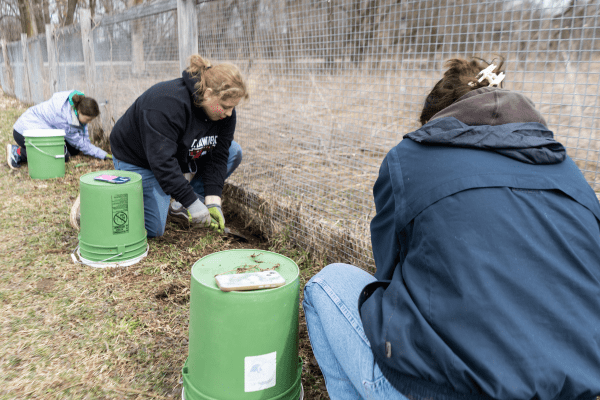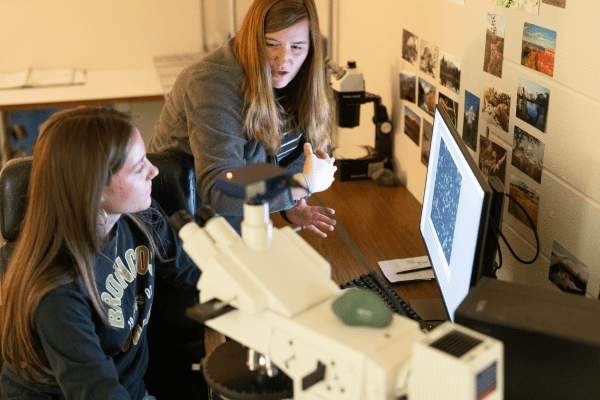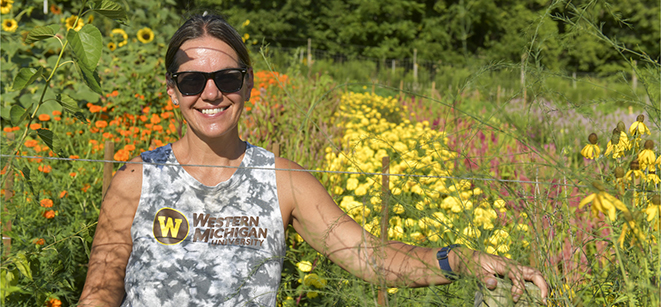Careers & Experiences
Students often approach faculty for career preparation advice, which we are happy to provide. Here are some key things to think about, including links to a wealth of resources you can use to prepare yourself for your future career. We survey alumni regarding their successful career searches to inform current students of the variety of careers available for graduates. We are also in contact with many local employers who have internship opportunities. Do not hesitate to contact our office or connect with our faculty for additional information or advice.
Educate and prepare yourself for your future job applications
- Please don't wait until you're about to graduate to take steps to prepare yourself for your future career.
- Do some career planning. Research the field(s) you may be interested in pursuing and determine what the minimum and preferred requirements are. For example, valuable information on ecological careers of various types is provided by the Ecological Society of America, and you can learn about careers in geography through the American Association of Geographers. Do your own searches on other careers you may be interested in.
- Then ask yourself how you'll make yourself competitive- are you doing everything you can to meet those requirements? Are you taking the necessary courses? Have you made a plan for how you're going to get the required work or volunteer experience, training, certifications, etc.?
- Here at WMU, we have excellent career development support for students through Career and Student Employment Services. You can get career advising and career counseling, search available jobs and internships by program, including those on campus, find lists of employers of our graduates, get help with resume and cover letter writing, and learn how to prepare yourself for interviews, including practice sessions.
Gain relevant experience and be engaged
As best as you can and within your own personal set of constraints, try to gain experience relevant to your field or area(s) of interest. There are a number of ways to accomplish this:
- Look for relevant jobs or internships.
- Many organizations, from businesses to state and federal government agencies to non-profits, often look for students to fill internships or regular positions.
- These positions can take place during the academic year or be restricted to a particular time of year (e.g. summer) and maybe full-or-part-time.
- The School of Environment, Geography, and Sustainability regularly sends out information to its students when it learns of available positions and works with local organizations to develop work experience opportunities for our students.
- There are numerous places to look on the internet for relevant jobs. We've compiled a list of useful sites in which you can search for jobs, but also make sure you search widely and find your own opportunities.
- Consider getting credit for your internship or work experience: Students who arrange so in advance may, with faculty supervision and in consultation with the host institution, develop a specific project to receive credit. This is a great way to get professional experience and academic credit at the same time!
- Pursue certifications (see our list of relevant certification programs). Certifications offer opportunities to develop practical skills for a specific outcome or skill set, can help you stand out from a crowd of applicants, and may be required for certain jobs.
- Volunteer for a local or national organization relevant to your field. Here on campus, consider getting involved in a relevant student group such as the Geography Club, Students for a Sustainable Earth (SSE), and the BioClub, or get involved as a volunteer with the Office for Sustainability (OfS). Better yet, apply for a Student Sustainability Grant and carry out a project (and consider doing so for credit!).
- Through any experience you have, pay attention to the opportunity to develop beneficial soft, professional skills such as time management, how to work well in groups and deal with a diversity of personalities, how organizations are structured and function, and how to communicate effectively with superiors/subordinates/customers/clients. Always look for opportunities to develop professional relationships that can lead to references for future job applications.
- The School of Environment, Geography, and Sustainability is committed to facilitating beneficial experiences for our students. Contact our office for help and advice. We also may be able to facilitate experiential learning for our students with financial constraints.
The sooner and more often you work on becoming a future professional, the more likely it is you will be successful in landing those all-important jobs as a student or graduate of our programs.
The following sites often list jobs of relevance to students in our programs.
- The School of Environment, Geography, and Sustainability (SEGS) provides this list of job resources as an informational resource. We do not endorse any other organization, and listing on this site does not imply any affiliation with or support by the school.
- Not all sites will have open positions at any given point in time. Check sites that interest you regularly, as new openings are always being posted (particularly as we approach summer each year)
- When looking at openings (and certainly before accepting an offer), be sure to fully research and understand all job requirements, expectations, remuneration, and health and safety concerns to ensure that you end up in a good situation
Government Jobs
Federal Government
Anyone can create a "profile" and receive a notification when something becomes available that matches the areas of interest specified in the profile
Michigan Department of Natural Resources Seasonal and Temporary Positions
Park rangers and workers, positions in the Wildlife Division
State of Michigan
Information on obtaining job notices by email can be found here
National Geospatial-Intelligence Agency
U.S. Department of Energy
Lots of opportunities for internships and fellowships.
Michigan Department of Environment, Great Lakes, and Energy (EGLE)
Internships are typically posted and open for application in late December or early January
Biology and Natural Resource Conservation Jobs
Compendia:
Ecological Society of America’s ECOLOG-L Listserve
Sign up to receive notifications on jobs, internships, and graduate study opportunities
Great Lakes Commission GLIN-Jobs Email Group
Great source of job postings in the Great Lakes region, maintained by the Great Lakes Information Network (GLIN)
Specific Offerings:
American Association of Geographers
A compendium of opportunities including undergraduate student internships and graduate positions fellowships/assistantships.
Carp Solutions
Invasive carp management
Chicago Metropolitan Planning Council
Chicago Metropolitan Agency for Planning
Circle of Blue Internships
Internships in communications and data analysis/management for an organization focused on water conservation
Illinois GIS Association
Apply the filter ‘Internships’ under ‘Employment Type’
Illinois Environmental Protection Agency
Kalamazoo Nature Center Jobs and Internships
National Great Rivers Research & Education Center
Natural Resources Defense Council
New England Aquarium Marine Mammal Education and Research Intern
Region 1 Planning Council (Illinois)
Superior Watershed Partnership and Land Conservancy
Conservation and restoration projects
Trout Unlimited
Jobs and internships
U.S. Fish & Wildlife Service Directorate Resource Assistant Fellow Program
targeted at students interested in conservation careers and who are approaching the end of their bachelor’s degree or are graduate students. Two sites to find information at (listing different opportunities) are:
Virginia Space Grant Consortium
Look under the Heading ‘Higher Education Students’ at the top, then ‘Internships’
World Resources Institute
Variety of internships
Environmental Policy Jobs
Sustainable Brewing
Certifications can provide targeted training and hands-on experience to develop as a future professional in a particular field. Be aware that courses/sessions typically have a fee associated with them, so be sure that the certification is applicable and desirable to employers in the field you would like to pursue.
Ecological Society of America Certification
Designed for ecologists at all levels to demonstrate their expertise and exhibit their skill level to potential employers, clients, or colleagues.
International Society of Arboriculture Certified Arborist
Gain a professional level of knowledge and skill in the field of arboriculture to become a tree care professional
International Society of Sustainability Professionals Sustainability Associate Certification
Designed for those who are new to or are interested in entering the sustainability field, including students, recent graduates, and/or early career professionals.
Michigan Department of Agriculture and Rural Development Food Manager Certification
Food safety and allergen awareness training
Michigan Department of Agriculture and Rural Development Pesticide Applicator Certification
A required certification to be able to apply pesticides for a commercial purpose or in the course of employment
Michigan Department of Environment, Great Lakes, and Energy Wastewater Operator Certification Program
Rules and regulations, technical assistance, and certification for Wastewater System Operators
Michigan Farmer’s Market Association
Farmer’s Market Manager Certificate Program
Michigan Prescribed Fire Council
Prescribed fire for land stewardship and firefighting
Michigan State University Extension Conservation Stewards Program
Land management and conservation
Michigan State University Extension Master Gardener
Horticulture and volunteer leader training
National Environmental Health Association
Registered environmental health specialist/sanitarian, foodborne outbreak investigator, and comprehensive and professional food safety
National Registry of Environmental Professionals
Has numerous certifications in the environmental field, including environmental scientist, auditor, and manager, and waste management professional
Solar Energy International Solar Professionals Certificate Program
Residential and commercial photovoltaic systems and renewable applications
Solid Waste Association of North America (SWANA)
Solid waste, recycling systems, composting programs, and zero waste
Wild-foraged Mushroom Identification Certification Program
Become an expert mushroom identifier who can lawfully broker select wild-foraged Michigan mushrooms
If you know of other certifications not listed here, please let us know!
The School of Environment, Geography, and Sustainability (SEGS) provides these links for informational purposes only. SEGS does not endorse any specific organization providing certifications, and listing on this site does not imply any affiliation with or support by SEGS.
The School of Environment, Geography, and Sustainability encourages experiential learning through internships and other applied opportunities. The School works to develop relationships in the community where students may gain a variety of professional experiences.
If you are interested in an internship, contact: Prof. Maarten Vonhof.
Prospective employers
Are you an employer interested in working with one of our outstanding students? Contact a departmental representative listed above with information regarding your internship opportunity. Current internships are posted in the department and forwarded to the appropriate class rosters.




